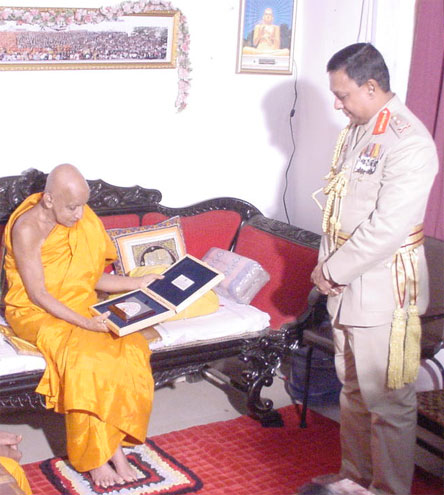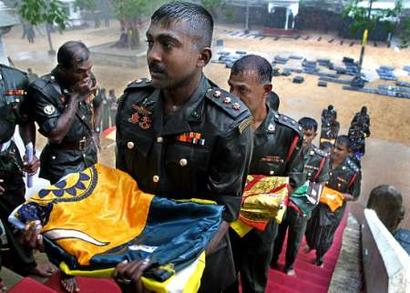Ilankai Tamil Sangam30th Year on the Web Association of Tamils of Sri Lanka in the USA |
||||||
 Home Home Archives Archives |
Reaching 60 and Nowhere to Go?by Kusal Perera, The Daily Mirror, Colombo, February 4, 2008
In all probability, this year’s Independence Day celebrations would be a show of military might with a strong call for patriotism. It would be a call to bear difficulties with a promise to end terrorism once and for all. Out of all those who would watch celebrations, those who would have their date of birth as 04th February, 1948, would turn out as pensioners from the following day. They would be 60 years old. This country would be as old as those pensioners. Looking back, most pensioners would say they have not much to grumble about. But looking back, can this country retire without grumbling ? For a third world country that was under colonial rule and was given the political right to define its own destiny, 60 years of independence is no small period and we are still a “developing” country. We thus have a question we need to find answers for? The balance sheet we could draw after 60 years of our own rule is pretty pathetic and miserably chaotic too. Last December, the Treasury had to draw loans at 22% interest from different banks to pay salaries, overtime and monthly pensions of public servants, a monthly ritual by now. Government contractors it is said have not been paid their due instalments for work done, valued in billions of rupees. Inflation is galloping at the rate of 26% and the CoL increases with equal speed. Time and again in the past, we have had comparatively more saner and softer periods, but never been in control of our destiny.
Looking at more important issues like education, transport and health, the picture is nothing less than depressing. The Supreme Court had to intervene in Grade I admissions and almost one month into the New Year, the issue is yet to be sorted out. Police often have to tear gas protesting undergrads to get Colombo roads cleared. Railway is archaic in its operations. Tiny cardboard tickets are still manually punched into an ancient iron contraption at the railway station in just the same way it was done a hundred years ago, to puff on rail tracks that have shrunk in length. In time, it now takes the same or more time to travel from Dehiwala to Fort in very much faster, computerised cars, as it took 50 years ago to travel from Kalutara to Fort in an old fashioned Morris Minor car. We now have very sophisticated hospitals in the cities with all the modern technology for a big price while in the periphery, government hospitals have wards full of complaints and shortages. What then are the improvements ? Sixty years and we have had two savage armed uprisings in the Sinhala society, both of which had to be brutally suppressed at the expense of democratic social life, apart from worthy human life lost. After few years of haggling, we went into open conflict with Tamil politics from 1957 and thereafter into a protracted war. Out of the 60 years since independence, 24 years have been spent waging an internal war. We have over 600,000 refugees now and thousands almost permanently living in Tamil Nadu, from where we had illicit immigrants swimming across the Palk Straits in search of greener pastures here, 50 years ago. Fifty years ago Lee Kwan Yu was looking at this “Paradise Island” with awe and wanted his little Singapore to be like “Ceylon”. Thirty years after independence, J.R. Jayewardene said he would turn Sri Lanka into a “Singapore”. Of course, “WE” have everything the modern world has turned out for luxury living. In fact we got colour TV even before India. We have IT and cyber cafes even in rural towns. We have 4.2 million mobile phone users and CDMA phones sold over the counter. We have all the brands of luxury cars from Porsches to Aston Martins on our roads and any designer label to be worn with the best of French perfume. It’s not the majority who could afford such life. The larger society has lost the social values and morals, lost democratic rights there were before, lost social mobility and lost its voice in the social discourse. It would suffice to add that on a very conservative estimate, 60 years after independence this country has over 37% of its citizens living in official poverty. There is no single political party that can wash their hands off from this chaos that we are living today. ALL leaderships are equally guilty of creating this mess. JRJ, the only pre independence political leader who survived to see all the changes in post independent Ceylon and Sri Lanka, writes in his book “Golden Threads – For the youth of Sri Lanka to whom the torch must pass” that politically “there were no further goals to achieve” (p/22) with independence. According to him we had “freedom of speech and assembly, regular elections on a multi-party basis and cabinet of government”(p/22). Better still, we were a member of the Commonwealth of Nations. So that settled everything for post independent Ceylon. This was precisely what the more urbane of the political elite in the country during independence, who were to steer this country to prosperity thought of independence. What use is “freedom of speech and assembly, regular elections on a multi-party basis and a cabinet of ministers” if we cannot achieve a Nation State that could ensure stability and achieve development ? The State we inherited was a State that was comfortable in English, could think in English and deliver in English. It was a State that left out the majority of its own citizens from “political power”. We had to therefore achieve a Nation State that was pluralistic in lingua, in religion, ethnic presence and in culture. The very first government in independent Ceylon under D.S. Senanayake’s Premiership negated this. The “Ceylon Citizenship Act of 1948”, the “Indian and Pakistani Residents Act No. 3 of 1948” and the “Ceylon Parliamentary Elections Amendment Act No. 48 of 1949” resolved and made into law by the first parliament, turned all plantation workers and people of Indian origin “stateless”. This disfranchising of Tamil citizens in hundreds of thousands overnight, sent shivers of suspicion within the Tamil political leadership in the government and paved for the split in the only Tamil political party, the ACTC and gave way for the ITAK, wrongly labelled as the Federal Party. It thus proved that of all who negotiated independence for Ceylon, no political leadership in that government had a vision for the future of Ceylon. We thus embarked on a very sectarian communal journey, with the Sinhala elements within the UNP breaking off to form the SLFP under Bandaranaiake in 1951, just 02 years after independence. To cut short a long mangled history to a few sentences, Bandaranaiake engineered the “Sinhalisation” of the State from 1956 that developed a “State ideology” which made political power the bastion of the Sinhala polity.
The State could only think, plan and work with Sinhala. That is plain reason why the State could not think of “Ruhunu, Wayamba or Northern” military regiments. Instead it could only think of Sinhala heroic names and we ended up with “Sinha, Gemunu, Gajaba” regiments and very lately with the “Nandimitra” regiment. Over the years the State became so much fanatically Sinhala thinking, it could see only the Sinhala dominant areas as Sri Lanka. We therefore had almost all the State owned corporations installed in the South. Mahaweli development wasn’t designed for the North. But Udawalawe in the far South that had nothing to do with Mahaweli diversion and was by then under the Udawalawe Development Scheme, was made a Mahaweli zone. On the other side, dry areas North of Vavuniya including Killinochchi that cried for agricultural water was simply ignored. It is true that all of the IRDP(P) implemented from1974 June in Sinhala dominated districts for over 20 years with billions of dollars coming in as foreign assistance are total failures. But the fact is this Sinhala State did not think it obligatory to include any of the Northern or Eastern districts for IRDPs. It wasn’t simply that the Tamil people were given letters written in Sinhala and their statements recorded in Sinhala. It was that the Sinhala State left out the Tamil polity from its decision making and implementing process. They were not included in the economic life of the country where the State was making decisions. And this was a period the whole economy was being owned and controlled by the State. When a society that has its own distinct language, its own culture and geographic presence giving them an ethnic identity different to the other society which takes over the State, it is not coincidental that a “left out” social feeling acquires a political meaning. That political meaning then translates itself into a demand over decades of agitations to seek a “State” of their own to achieve what they feel wasn’t made available to them by the State that had to be legitimate in serving all. For 60 years we travelled on this ethnically arrogant path aggravating and growing with the conflict that by now has turned into one of the most notorious conflicts in the world. |
|||||
|
||||||

